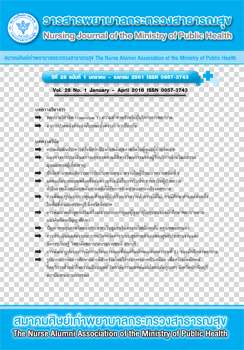Factors Predicting Medication Taking Behavior among Type 2 Diabetic Patients
Main Article Content
Abstract
This predictive correlation research was aimed to study medication taking behaviors and to identify predictive factors of 2 diabetes mellitus (T2DM) patients. Simple random sampling was used to recruit 470 patients who were diagnosed with T2DM. Data were collected by questionnaire comprising 5 parts, with a total of 51 items. Content validity was examined by Index of Congruence (IOC) and yielded a value of 1.00. The reliability of part 3 of the questionnaire was assessed by KR-20, and yielded a value of .73. Whereas parts 4 and 5 of the questionnaire were examined by Cronbach’s alpha, and obtained values of .79 and .84, respectively. Descriptive statistics were generated and stepwise multiple regression analysis was used.
The results revealed that medication taking behaviors were at a good level (M=25.38, SD=2.34). An analysis of predicting factors showed that perceived susceptibility regarding complication of T2DM (B=.60), knowledge (B=.23), and the amount of medication taken (B=-.03) accounted for 15% of variation in medication taking behaviors with a significance level of p <.05.
These findings suggest that healthcare personnel should be provided with the program to enhance perceived susceptibility about complications of T2DM, knowledge, and monitoring T2DM patients who have oral DM medication i.e., provide home visits to monitor medication taking behavior, establish a diabetes self-help group to share information on the risk of diabetes complications and management of anti-diabetics medication.
Article Details
บทความและรายงานวิจัยในวารสารพยาบาลกระทรวงสาธารณสุข เป็นความคิดเห็นของ ผู้เขียน มิใช่ของคณะผู้จัดทำ และมิใช่ความรับผิดชอบของสมาคมศิษย์เก่าพยาบาลกระทรวงสาธารณสุข ซึ่งสามารถนำไปอ้างอิงได้
References
2. Aekplakorn W. National Health Examination Survey for Thai Popluation, 5th, B.E. 2557. Nonthaburi: Health Research System Institute; 2014. (in Thai).
3. Sawasdimongkol P. Annual report B.E. 2558. Bangkok: The Printing Office Agency to assist veterans in Royal Shu patham; 2016. (in Thai).
4. Sparring V, Nyström L, Wahlström R, Jonsson PM, Östman J, Burström K. Diabetes duration and health-related quality of life in individuals with onset of diabetes in the age group 15-34 years – a Swedish population-based study using EQ-5D BMC Public Health. 2013;13(377):doi: 10.1186/471-2458-13-377
5. World Health Organization. Adherence to long-term therapies: evidence for action. Geneva, Switzerland: World Health
Organization; 2003.
6. Asche C, LaFleur J, Conner C. A review of diabetes treatment adherence and the association with clinical and economic outcomes. Clinical Therapy. 2011;33(1):74-109.
7. Diabetes Association of Thailand under The Patronage of Her Royal Highness Princess Maha Chakri Sirindhorn. Clinical Practice Guideline for Diabetes B.E. 2557. Bangkok: Aron Publisher; 2014. (in Thai).
8. Chao J, Nau DP, Aikens JE, Taylor SD. The mediating role of health beliefs in the relationship between depressive symptoms and medication adherence in persons with diabetes. Research in Social and Administrative Pharmacy. 2005;
1:508-25.
9. Tansakul S, Journal of Health Education. Health behavior in relation to health education and health promotion. Journal of Health Education. 2007;30(105):1-15. (in Thai).
10. Alatawi YM, Kavookjian J, Ekong G, Alrayees MM. The association between health beliefs and medication adherence among patients with type 2 diabetes. Research in Social and Administrative Pharmacy. 2016;12:914-25.
11. Kamran A, Sadeghieh Ahari S, Biria M, Malepour A, Heydari H. Determinants of Patient’s Adherence to Hypertension
Medications: Application of Health Belief Model Among Rural Patients. Annals of Medical and Health Sciences Research.
2104;4(6):922-7.
12. Adejoh SO. Diabetes Knowledge, Health Belief, and Diabetes Management Among the Igala, Nigeria. SAGE Open. 2014;1–8.doi: 10.1177/2158244014539966.
13. Dhippayom T, Krass I. Medication-taking behaviour in New South Wales patients with type 2 diabetes: an observational study. Australian Journal of Primary Health. 2015; 21(4): 429-37.
14. Abebaw M, Messele A, Hailu M, Zewdu F. Adherence and Associated Factors towards Antidiabetic Medication among Type II Diabetic Patients on Follow-Up at University of Gondar Hospital, Northwest Ethiopia. Advances in Nursing. 2016; 2016(Article ID 8579157, 7 pages, 2016. doi:10.1155/2016/8579157).
15. Komkunthod C. Factor associated with medication adherence of type 2 diabetes. Bangkok: Mahidol University; 2001.
16. Supachaipanichpong P, Watanasomboon P, Tansakul S, Chomchun P. Knowledge and Beliefs in Medication Use among Diabetic Patients with Non-medication Adherence Veridian E-Journal Science and Technology Silpakorn University. 2014; 1(1):1-12. (in Thai).
17. Chondan Hospital. Annua report B.E. 2558. Petchaboon Province: Chondan Hospital; 2015. (in Thai).
18. Osterberg L, Blaschke T. Adherence to Medication. The New England Journal of Medicine. 2005; 353: 487-97.
19. Wungthanakorn S, Phatidumrongkul C, Khomchan P. Factors affecting medication taking behaviors in hypertensive patients. Songkla Medical Journal 2008;(26):6 (in Thai).
20. Jirawatkul. A. Biostatistics for health science research. Bangkok: Offset Creation; 2010. (in Thai).
21. Best J.W. Research in education. New Delphi: Prentice Hall of India Pvt. Ltd; 1977.
22. Singchangchai P. Principles and using multivariate statistics analysis for nursing research. Songkla: Chanmuang Publisher; 2006. (in Thai).
23. Wisutcharoenporn A. Medication use behaviors of diabetic patient in DM clinic at Bankhai hospital Rayong province. Region 11 Medical Journal. 2013; 7(11): 519-29. (in Thai).
24. Kleepattra Chaisri K, Na Ayuthya SK, Puwarawuttipanit W, Peerapatdit T. Factors Predicting Medication Use Behaviors of Type 2 Diabetic Patients. Journal of Nursing Science. 2013; 31(3): 67-75. (in Thai).
25. Bayat F, Shojaeezadeh D, Baikpour M, Heshmat R, Baikpour M, Hosseini M. The effects of education based on extended health belief model in type 2 diabetic patients: a randomized controlled trial. Journal of Diabetes and Metabolic Disorders. 2013; 12(45).
26. Najjar A, Amro Y, Kitaneh I, Abu-Sharar S, Sawalha M, Jamous A, et al. Knowledge and Adherence to Medications among Palestinian Geriatrics Living with Chronic Diseases in the West Bank and East Jerusalem. PLoS ONE. 2015; 10(6): e0129240. https://doi.org/0129210.0121371/journal.pone.0129240.
27. Thayer S, Arondekar B, Harley C, Darkow TE. Adherence to a fixed-dose combination of rosiglitazone/glimepiride in subjects switching from monotherapy or dual therapy with a thiazolidinedione and/or a sulfonylurea. Annual Pharmacotherapy. 44: 791-9.
